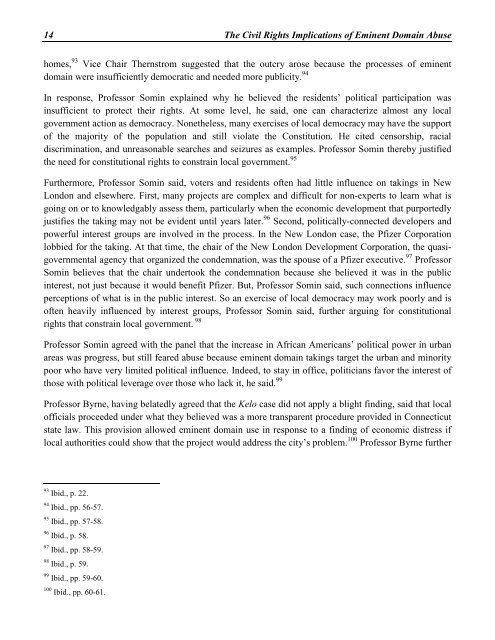You also want an ePaper? Increase the reach of your titles
YUMPU automatically turns print PDFs into web optimized ePapers that Google loves.
14 The Civil Rights Implications of <strong>Eminent</strong> <strong>Domain</strong> Abusehomes, 93 Vice Chair Thernstrom suggested that the outcry arose because the processes of eminentdomain were insufficiently democratic and needed more publicity. 94In response, Professor Somin explained why he believed the residents’ political participation wasinsufficient to protect their rights. At some level, he said, one can characterize almost any localgovernment action as democracy. Nonetheless, many exercises of local democracy may have the supportof the majority of the population and still violate the Constitution. He cited censorship, racialdiscrimination, and unreasonable searches and seizures as examples. Professor Somin thereby justifiedthe need for constitutional rights to constrain local government. 95Furthermore, Professor Somin said, voters and residents often had little influence on takings in NewLondon and elsewhere. First, many projects are complex and difficult for non-experts to learn what isgoing on or to knowledgably assess them, particularly when the economic development that purportedlyjustifies the taking may not be evident until years later. 96 Second, politically-connected developers andpowerful interest groups are involved in the process. In the New London case, the Pfizer Corporationlobbied for the taking. At that time, the chair of the New London Development Corporation, the quasigovernmentalagency that organized the condemnation, was the spouse of a Pfizer executive. 97 ProfessorSomin believes that the chair undertook the condemnation because she believed it was in the publicinterest, not just because it would benefit Pfizer. But, Professor Somin said, such connections influenceperceptions of what is in the public interest. So an exercise of local democracy may work poorly and isoften heavily influenced by interest groups, Professor Somin said, further arguing for constitutionalrights that constrain local government. 98Professor Somin agreed with the panel that the increase in African Americans’ political power in urbanareas was progress, but still feared abuse because eminent domain takings target the urban and minoritypoor who have very limited political influence. Indeed, to stay in office, politicians favor the interest ofthose with political leverage over those who lack it, he said. 99Professor Byrne, having belatedly agreed that the Kelo case did not apply a blight finding, said that localofficials proceeded under what they believed was a more transparent procedure provided in Connecticutstate law. This provision allowed eminent domain use in response to a finding of economic distress iflocal authorities could show that the project would address the city’s problem. 100 Professor Byrne further93 Ibid., p. 22.94 Ibid., pp. 56-57.95 Ibid., pp. 57-58.96 Ibid., p. 58.97 Ibid., pp. 58-59.98 Ibid., p. 59.99 Ibid., pp. 59-60.100 Ibid., pp. 60-61.


